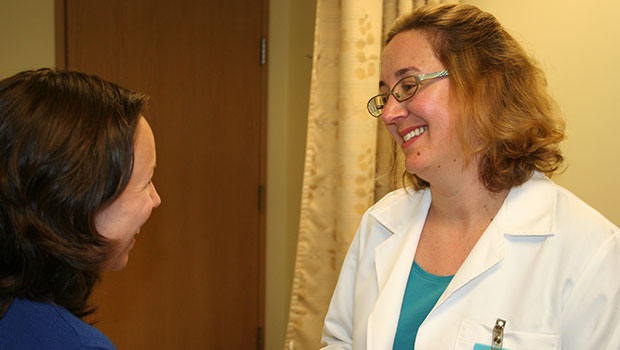How can we ensure safe medications for mothers-to-be?

Dr. Sascha Dublin is a Group Health physician and researcher working on drug safety.
In this Q and A, Dr. Sascha Dublin describes how research using real-world data can ease suffering and prevent harm during pregnancy
Somewhere, right now, a woman is finding out that she is pregnant. Whether it’s her first baby or her third, the questions start coming. Will it be healthy? Will it be a girl or boy? What will the baby’s name be? The answers will take a little time.
But when an expectant mother asks if a medication is safe, the answer should be within easy reach. Surprisingly, it’s often not.
Group Health Research Institute is working to change that through practical medication-safety research led by Sascha Dublin, MD, PhD—a physician, researcher, and mom of two. Here, Dr. Dublin explores how tapping the power of real-world data can help ensure pregnant women don’t suffer needlessly because of a medication they choose to take—or not to take.
Q: Why is it so important to study medication safety in pregnancy?
A: The medical community actually knows very little about which medications are safe for women to take when they’re pregnant. For the areas I am studying, most clinical trials were done a long time ago and involved relatively few pregnant women. And while it’s understandable that many of these trials would exclude expectant mothers, it leaves us with scant evidence about medication safety in pregnancy.
In fact, a recent review article showed that of the 50 medications pregnant women use most often, only two have adequate evidence about whether they are safe in pregnancy. So when it comes to drugs that are staples in a doctor’s practice—like a certain antibiotic that works best for a skin infection—we often don’t prescribe them because we can’t be sure they’re safe.
This uncertainty also causes many women to avoid taking both over-the-counter and prescription medications when they’re pregnant. For some, it just means they suffer through a minor illness instead of taking something to ease their symptoms. But for the thousands of pregnant women who have depression or other chronic conditions, not taking their prescription medications can be a life-threatening decision.
I believe pregnant women deserve better. They should have informed choices. Right now, they don’t.
Q: What made you decide to do research in this area?
A: I have always studied medication safety—initially in relation to cancer risk, and later focused on older people. Then I had two babies. When I was pregnant, my doctor prescribed two medications for minor problems. But like many women, I didn’t take them because I was concerned about harms they might cause that we just don’t know about.
Then a colleague in the Health Care Systems Research Network (HCSRN) invited me to work on a large, multi-site study on medication safety in pregnancy. I said yes because I believe pregnant women deserve better. They should have informed choices. Right now, they don’t.
With hypertension, for instance, medication decisions are being made for hundreds of thousands of pregnant women each year using data collected on a few thousand women, in some cases from decades ago. Certain medications have been around so long that probably everyone assumes we’d be able to tell if they were causing harm during pregnancy. The truth is that we really aren’t sure. But with the right kind of research, we can get the evidence we need.
Q: How can your research help pregnant women and their doctors make informed choices?
A: Real women who are pregnant are taking medications every day. And at Group Health, we have the unique ability to study the impact of these choices using real data from everyday settings. This gives us a view of the bigger picture, and it can provide the evidence women and their doctors need to make informed decisions.
For one, we can study long-term outcomes among our patients who stay enrolled over time. Most clinical trials can only look at short-term outcomes. But we can study the health of mothers and babies over 5 to 10 years—or even longer. Our data are also extraordinarily rich because we have access to lab test results and patient charts. This gives us insights into harms and benefits of medications that other studies may not be able to detect.
Plus, by working with other health systems in the HCSRN, we can study much larger, more diverse populations. In one research project alone, we can include data on 10 times more pregnant women than have ever been studied in clinical trials.
For instance, we recently designed a study on the safety and effectiveness of different medications for women with high blood pressure in pregnancy. If funded, the study will include data on about 30,000 pregnant women with high blood pressure, about 8,000 of whom took medications. In contrast, a review article found that so far, only about 1,200 women have been studied across the clinical trials comparing different medications for hypertension in pregnancy.
Our study would also include thousands of African American and Hispanic women—an asset that sets us apart from most clinical trials. This is important because different medications might work better for women of different race or ethnicity.
Our long-term vision is that when a pregnant woman gets sick, she will know which medications she can safely take to ease her suffering and protect her health. When doctors are treating a pregnant woman with gestational diabetes, they will know which approach is better and safer—insulin or an oral medication. When a woman with depression gets pregnant, she will know whether it’s okay to keep taking her antidepressant—instead of stopping it based on fear, risking her own health to protect her baby from possible harm.
The answers to all these questions are out there. We just need to find them.


